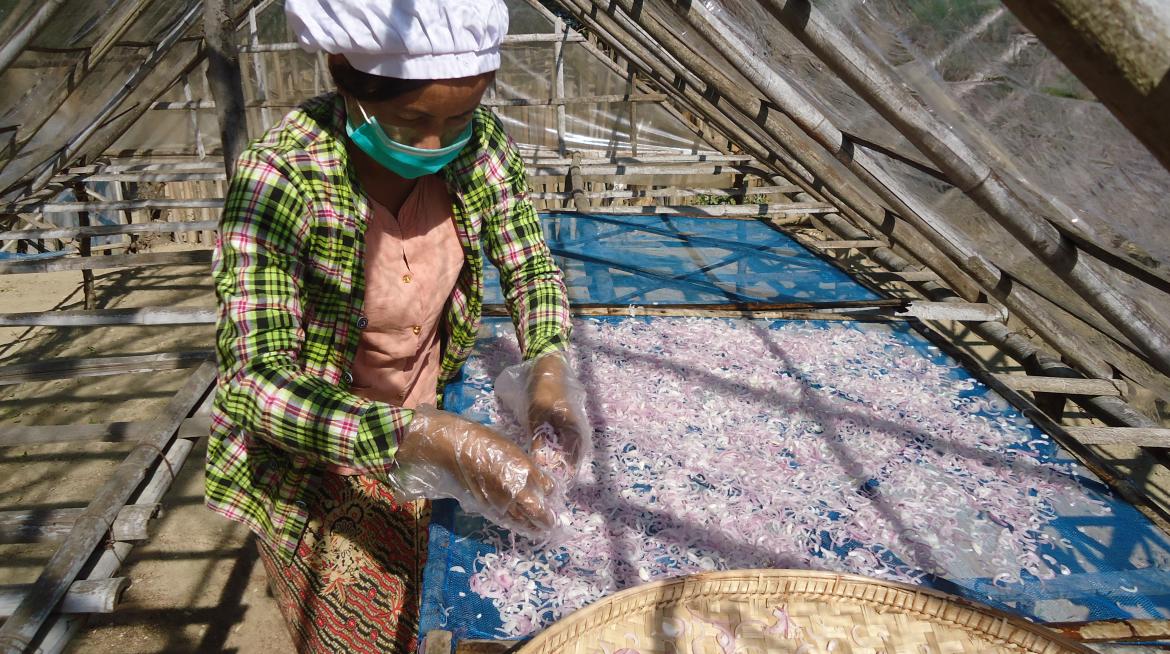
Myanmar Times | 09 December 2014 - How can smallholder farmers have the opportunity to supply the food on your table and the beverage in your hand? The multi-donor Livelihoods and Food Security Trust Fund (LIFT) involves smallholders and the rural landless poor in Myanmar’s economic growth, helping them to raise their incomes, improve their nutrition and live better lives. Here are three innovative LIFT-funded projects that are helping smallholder agribusinesses to thrive.
Dehydrated onions in the Dry Zone
LIFT partner and NGO Ecodev has spent the last few years working with smallholders in Magwe township, identifying and developing a niche product to help them raise their incomes. By May this year, when LIFT’s funding for the three-year Scaling Up Rural Enterprises project drew to a close, over 400 people from 10 villages had set up household-based dehydrated onion enterprises. They mainly sell the high-quality produce to the Association of Restaurants in Myanmar.
Ecodev’s role was to provide a business model, train the farmers and processors to focus on quality produce, and link them to markets. “Before the project I kept fresh onions at home, but there was withering and much wastage,” says onion processor Daw Mya Win of Taegikone village. “The technical training has made the process much more solid and efficient.”
The path has not been easy, however, with local processors having to cope with fluctuating onion prices and the rainy season dearth of local produce. But they proved to be remarkable problem-solvers and the results are sound – in the project area, 25 percent of low-income households have become entrepreneurs, surpassing the project’s modest 3pc goal.
In an area where there is little dry season employment, the project is particularly popular among women. “I can stay at home with my family year-round now,” says entrepreneur Daw Thein Nwet. “I don’t have to leave to find work in the town, and I can now afford to send the children to school.”
EcoDev is now looking to introduce the product to international markets. It was featured at the ASEAN Food Conference in Singapore in 2013 and awarded an ASEAN Food Products Recognition certificate. This success has given the farmers confidence to look at developing other products, such as dried hibiscus, for the overseas Myanmar market.
Growing tea in Kokang Special Administrative Region
On the China border, where the ex-opium poppy farmers are fiercely independent, LIFT partner CARE has had its work cut out to encourage collective, community-led tea production.
Tea production in these hills predates the narcotics trade, but by 2003, when a government ban was placed on poppy cultivation, farmers had lost their forefathers’ tea-growing knowledge. CARE’s project provides training and resources along the tea value chain, and has been particularly successful in introducing improved tea-drying facilities. After three years of project implementation, farmers have formed the Tar Shwe Tan Tea Association, and their tea is recognised for its high quality. CARE reports that the project’s 723 farming families now generate around US$680,000 in sales income per year, with most sales being made to China.
Plan Bee: gathering honey in southern Shan State
In the picturesque hills above Inle Lake, LIFT funds a project encouraging beekeeping activities, implemented by the NGO Tag.
The project started last year, with the aim to upgrade the technical skills and marketing know-how of some 560 beekeepers, who can sell honey and apiculture-related products. Around 68,000 farms also benefit since they are in the catchment for bee pollination, which can lead to higher crop yields.
“Farmers don’t understand how important honeybee pollination is to their crops,” says Tag country manager U Saw Aung Myint. “Bees are also important for making forests sustainable. So far, the project has conducted awareness-raising training in 28 villages in the area.”
“Bees do much more than produce honey,” says Shaike Stern, Tag’s agronomist and expert beekeeper. “Bees produce a range of highly valuable products such as pollen and wax. They also serve as a bellwether for environmental problems.”


